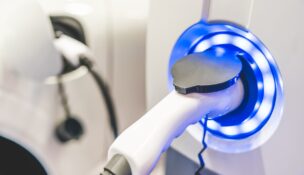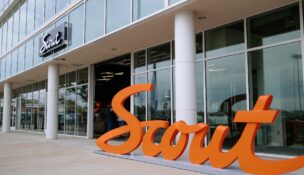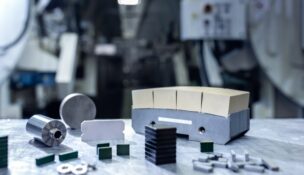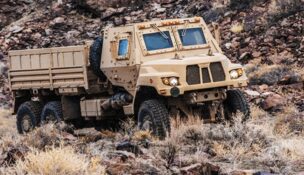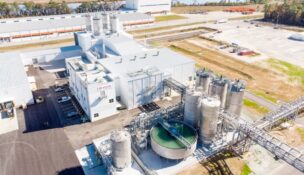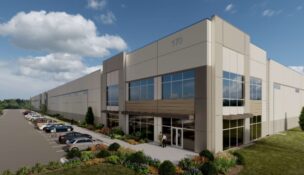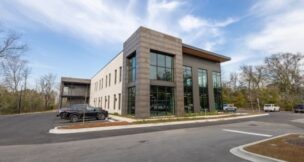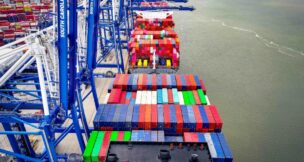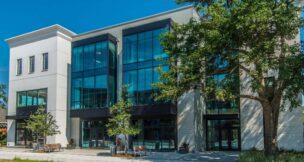Volvo readies for next stage in Ridgeville
Staff //December 7, 2021//
Volvo Cars’ Ridgeville plant is ready to ramp up production with a major hiring push, but finding the right talent as the company expands has been an ongoing challenge.
When Volvo established its Lowcountry operations in 2015, the company looked to South Carolina as a robust manufacturing economy with experienced laborers. However, with a 3% unemployment rate at the time, the majority of the experienced individuals were already employed, Berkeley County Economic Development Director Kristen Lanier said.
Growing a new skilled workforce from the ground up has been a diligent process for the company, but both Volvo and South Carolina continue to prove their commitment to making it work.
Volvo Car Charleston Plant Manager David Stenström spoke about the company’s progress to a crowd of Berkeley County Chamber of Commerce members Nov. 19 at Trident Technical College. Stenström shared that he is optimistic that the labor challenges are short-term given South Carolina’s commitment to training solutions.
When one teacher off-the-cuff asked if Stenström would be willing to collaborate with educators to find instructors for manufacturing classes, and also to help generate awareness in local K-12 schools, the plant manager didn’t hesitate to say yes, even if he doesn’t quite have the “how to” solution yet.
“I’m not worried that we will not find the competence in the schools, especially with the universities,” he said.
A strong talent pool will be needed for years to come as Volvo works toward its production capacity of 150,000 vehicles annually. Still ramping up to its goal, Ridgeville produced 26,500 vehicles from the S60 luxury sedan line in 2020, a year plagued with pandemic-related and supply chain challenges.
Moving forward, Volvo’s ambitions are to electrify 50% of the company’s fleet, with the remainder coming from hybrid models. That means, on top of manufacturing the gas and hybrid versions of the S60, the Volvo Cars Ridgeville facility will produce two additional electric vehicle lines: the still unnamed next generation XC90 and the Polestar 3, an SUV. The vehicles produced in South Carolina will primarily be sold in the U.S. and European markets.
As a global company, the Swedish automotive manufacturer has two plant concepts: produce 30 jobs an hour or 60 jobs an hour. Sweden and Belgium manufacture 60 cars an hour, which accumulates to 300,000 cars a year. The goal for the still up-and-coming U.S. and China plants is to reach 30 a day as soon as possible, Stenström said.
“For me as a plant manager, my job is to be in that category by being competitive and getting to the top,” Stenström said.
Joining Volvo in 1995, Stenström relocated to the U.S. from China to helm the South Carolina plant starting in January 2021. But he’s still getting used to the cultural changes, particularly in the workforce — especially since there is no other Volvo plant in the U.S.
In China, employees worked 11-hour shifts, six days a week and commonly sought overtime. Here in the U.S., especially in the Lowcountry, quality of life is sometimes prioritized over work, Stenström thinks.
Volvo’s Ridgeville facility also appeared to have high turnover rates in comparison to China’s, but Lanier said turnover is a loosely defined term when comparing plants in two different countries and cultures. Turnover rates in Ridgeville are normal for the industry in the U.S.
South Carolina organizations are doing their best to bridge the labor gap and train workers, whether through technical colleges, trade schools, certification programs or planting the seed for manufacturing careers in K-12.
The hope is for Volvo to hire talent in Berkeley County, or at least within South Carolina, Lanier said.
The efforts to hire in-state are what sparked ManuFirst, a manufacturing training program Volvo helped create curriculum for. Completing the program equals one year of manufacturing experience. To-date, Berkeley County has paid more than $400,000 in scholarships to county residents to provide ManuFirst training, Lanier said.
The Charleston Regional Development Alliance is another organization that works to support Volvo, particularly bringing suppliers closer. David Ginn, CRDA president and CEO, said it’s a dance of timing, where production volumes and investment level have to meet.
Ginn said the CRDA has worked collectively with suppliers for years, but until the volumes are such that they can justify investment, they might not come. “And these OEMs, they don’t want to ask the companies to come, because if they fail then they’re liable to them potentially," he said.
Under Stenström’s lead, Volvo has seen an increase in localization of suppliers, but ideally he’d like to see 90% of all materials used at the plant be produced in North America.
“For me, you need to produce where you sell, but you also need to source where you produce,” Stenström said.
Ginn likened the supplier situation to the Mercedes-Benz Vans plant in Ladson, where the company originally invested $40 million in Sprinter Van assembly. Vehicles were manufactured in Dusseldorf, disassembled and shipped to the U.S., and then re-assembled in South Carolina to reduce costs for importing completed vehicles.
Once the local plant reached volume, Mercedes-Benz promised to invest another $500 million into an original equipment manufacturing facility, and true to its word, the company upped its commitment a decade later.
“The same with Volvo,” Ginn said. “As sales grow, suppliers will feel comfortable coming.”
Once there, the next step will be identifying key players that need to come to South Carolina.
Battery producers for the electric vehicles is at the top of Stenström’s list. Currently, batteries are shipped from China to the U.S., which given the hazardous materials, premium prices and shipping issues, costs upward of hundreds of millions of dollars “for no reason,” he said. Manufacturing batteries nearby would not only be significantly cheaper, but would be less of a transport risk and could see delivery shrink down to a day or two.
“You will see a lot of conversations in the future, talking localization from a headquarters point of view,” he said.
To round out preparation on a county level, Lanier said Berkeley County needs to repopulate its warehouse product with sites and buildings that are ready for those suppliers.
“The coronavirus actually expedited a lot of the real estate absorption that we saw last year,” she said of Berkeley County’s 3 million square feet of industrial space. “A lot of our premium spots along I-26, those speculative buildings were queuing up for Volvo suppliers that were taken down for distribution warehouses, and now we find ourselves trying to replenish and identify new spots for when Volvo suppliers do start coming.”
Stenström thinks they will. Like a Volvo car, he just needs to drive with a smooth and steady hand until Ridgeville gets there.
S





